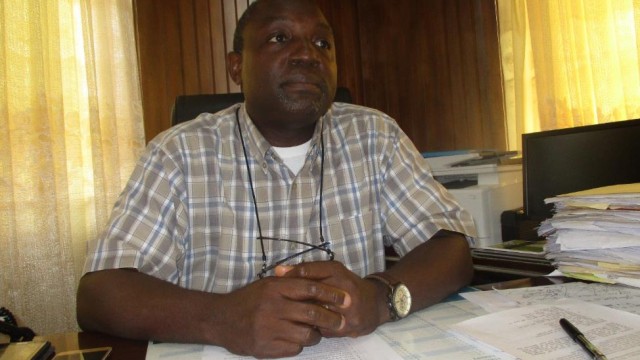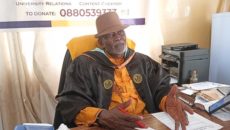SUAKOKO, Bong – In an effort to beautify the main campus and reduce years of dust and mud, the administration of Cuttington University has embarked on the pavement of 4.4 km of roads on the Suakoko campus.
The pavement is the first of its kind on the university’s campus in the almost 68 years of operation in central Liberia.
Cuttington was relocated to central Liberia from Cape Palmas, Maryland in southeastern Liberia in 1948. Instructional classes began in 1949.
The university’s newly inducted president, Herman B. Browne, put the cost of the concrete pavement between US$200,000-250,000. He said the pavement, when completed, would reduce dust and mud and beautify the campus and create an enabling environment for students, faculty members and visitors of the university.
[Full disclosure: The author of this article is a graduating senior student of Cuttington University.]
Browne, who is serving his first year as president of Cuttington, told The Bush Chicken in an interview recently that the project is being funded from students’ tuitions.
The pavement is not the only infrastructure project being done on Cuttington’s main campus. Browne also announced plans for the renovation, construction, and expansion of some facilities at Cuttington.
“The facilities need to be expanded; some of them need to be modernized and clearly there are a few that still need to be renovated,†Browne said. “I think I need to renovate the faculty houses.â€
He said USAID has agreed to construct some new faculty housing this year at the Rural Development Institute on the university’s campus for faculty members.
Browne said there is a need for a conference hall for the university as major conferences and other gatherings are being held in either the Epiphany Chapel or in the Seth C. Edwards Cafeteria.
Asked about funding sources for Cuttington University, Browne said, “We have only two main sources: one is the tuition fees coming through, and the other is the Government of Liberia’s subsidies. Apart from that, we may occasionally get interests that accrued on some remote trust funds which wouldn’t amount to more than about US$50.000 over any one or two years.â€
He said the university also finds money through contacts with friends either in Europe or America and people who sometimes become interested in programs or some aspects of the university and provide support.
Browne is meanwhile appealing for financial support to help fast-track infrastructural development on the three campuses of the university. Cuttington currently runs a junior college in Kakata, Margibi, a graduate school in Monrovia and its main campus in Suakoko, Bong.
He said the university needs more funds to also take care of the salaries for its professors and lecturers, as well as taking care of its administrative costs.
“I’d like to call on everybody for their support. I’d like to call on people to knock on the doors or on Capitol Hill to see the importance of supporting Cuttington. I like to call on everybody to come and visit Cuttington and see what we’re doing and try to identify what it is about what we do that whatever small bit they can do to be a help,†Browne said.
He said a lot needs to be done at Cuttington in terms of infrastructure, water systems, libraries, and laboratory training for instructors.
With regards to his vision for Cuttington University, Browne said he envisions a university where other universities can look up to it and consider it a “center of learning and a new area for research and expertise.â€
He said there are pressing needs for the expansion of the university’s programs, including Information Technology, Geographical Information Systems, and Law.
Browne added that he wants to work with all stakeholders of Cuttington University to ensure that the institution turns out to be a vibrant place to work, a vibrant place to learn, and a place full of potential for research and development.
Featured photo by Moses Bailey




